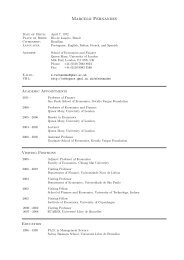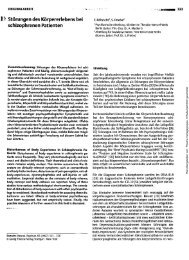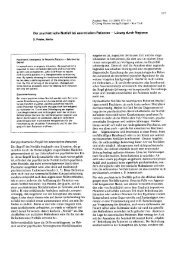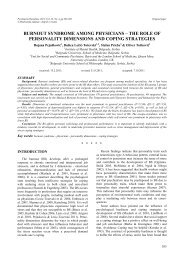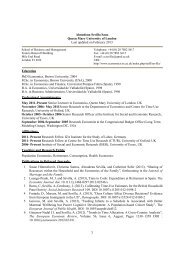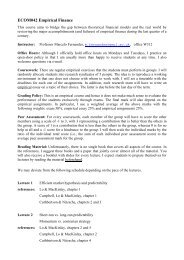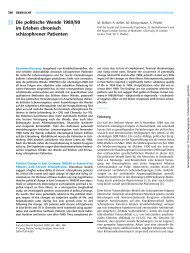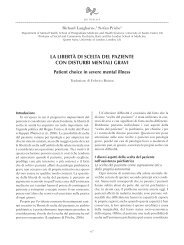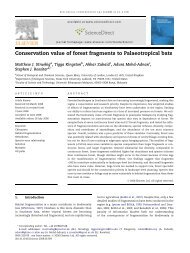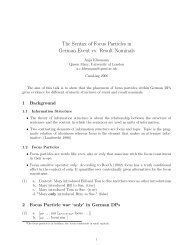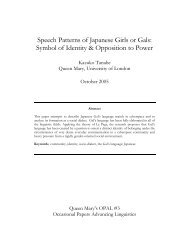Proofs - Personal Webspace for QMUL - Queen Mary, University of ...
Proofs - Personal Webspace for QMUL - Queen Mary, University of ...
Proofs - Personal Webspace for QMUL - Queen Mary, University of ...
You also want an ePaper? Increase the reach of your titles
YUMPU automatically turns print PDFs into web optimized ePapers that Google loves.
© 2012 Elsevier Masson SAS. All rights reserved.<br />
European Psychiatry 27 (2012) / supplement n°2 / S76-S80<br />
Teaching psychiatry and establishing psychosocial services<br />
– lessons from Afghanistan<br />
I. Missmahl a , U. Kluge b , Z. Bromand c , A. Heinz b, *<br />
a International psychosocial organization (IPSO).<br />
b Department <strong>of</strong> Psychiatry and Psychotherapy, Charité – Berlin, Germany<br />
c Department <strong>of</strong> Psychiatry and Psychotherapy at St Hedwig Hospital, Charité - <strong>University</strong> Medicine Berlin, Germany<br />
Keywords:<br />
Afghanistan<br />
Mental health<br />
Training <strong>of</strong> psychosocial counsellors<br />
1. Introduction<br />
ABSTRACT<br />
Countries suffering from long term civil war, such as<br />
Afghanistan, are characterized by high rates <strong>of</strong> traumatization [14].<br />
Quite <strong>of</strong>ten, such prolonged confl icts also impair the education <strong>of</strong><br />
medical students, particularly in topics that –in spite <strong>of</strong> evidence<br />
to the country– are widely not recognized as urgent or life saving<br />
such as mental health.<br />
In spite <strong>of</strong> a population in which more than 50% have been<br />
reported to suffer from symptoms <strong>of</strong> posttraumatic stress<br />
disorder and other symptoms <strong>of</strong> affective disorders [9], Kabul,<br />
a city with more than 5 Million inhabitants, hosts only two public<br />
psychiatric inpatient services besides newly developed addiction<br />
centers. Such sparse medical resources <strong>for</strong> the treatment <strong>of</strong><br />
mental disorders are rather normal in large parts <strong>of</strong> the world:<br />
the average number <strong>of</strong> psychiatrists in high income countries is<br />
200 times greater than that in low income countries [11].<br />
In the academic teaching hospital <strong>of</strong> Kabul’s Medical Faculty,<br />
training <strong>of</strong> medical students in psychiatry and psychotherapy is<br />
limited to a two week internship during the last year <strong>of</strong> medical<br />
* Corresponding Author.<br />
E-mail address: andreas.heinz@charite.de (A. Heinz)<br />
<strong>Pro<strong>of</strong>s</strong><br />
68767<br />
EUROPEAN<br />
PSYCHIATRY<br />
THE JOURNAL OF THE EUROPEAN PSYCHIATRIC ASSOCIATION<br />
ISSN 0924-9338<br />
June 2012<br />
Vol. 27 - Supplement n°2<br />
pp. S1-S81<br />
Migration<br />
and Mental Health<br />
S1 Editorial<br />
A. Heinz, U. Kluge<br />
S4 The willingness to participate in health research<br />
studies <strong>of</strong> individuals with Turkish migration<br />
backgrounds: barriers and resources.<br />
A qualitative analysis <strong>of</strong> focus groups<br />
D. Dingoyan, H. Schulz, M. Mösko<br />
S10 Socio-economic status and emotional distress<br />
<strong>of</strong> female Turkish immigrants and native<br />
German women living in Berlin<br />
MC. Aichberger, Z. Bromand, A. Heredia<br />
Montesinos, S. Temur-Erman, A. Mundt, A.<br />
Heinz, MA. Rapp, M. Schouler-Ocak<br />
S17 Mental health <strong>of</strong> Turkish woman in Germany:<br />
resilience and risk factors<br />
Z. Bromand, S. Temur-Erman, R. Yesil,<br />
A. Heredia Montesinos, MC. Aichberger,<br />
D. Kleiber, M. Schouler-Ocak, A. Heinz,<br />
MC. Kastrup, MA. Rapp<br />
S22 The infl uence <strong>of</strong> stigma on depression, overall<br />
psychological distress, and somatization<br />
among female Turkish migrants<br />
A. Heredia Montesinos, MA. Rapp, S. Temur-<br />
Erman, A. Heinz, U. Hegerl, M. Schouler-Ocak<br />
S27 Translation and adaptation <strong>of</strong> the Zung<br />
Self-Rating Depression Scale <strong>for</strong> application<br />
in the bilingual Azerbaijani population<br />
F. Mammadova, M. Sultanov, A. Hajiyeva,<br />
M. Aichberger, A. Heinz<br />
S32 Construction and interpretation <strong>of</strong> self-related<br />
function and dysfunction in Intercultural<br />
Psychiatry<br />
A. Heinz, F. Bermpohl, M. Frank<br />
S44 Explanatory models and concepts <strong>of</strong> West<br />
African Malian patients with psychotic<br />
Symptoms<br />
F. Napo, A. Heinz, A. Auckenthaler<br />
S50 How to express mental health problems:<br />
turkish immigrants in Berlin compared to native<br />
Germans in Berlin and Turks in Istanbul<br />
A. Vardar, U. Kluge, S. Penka<br />
S56 Health services and the treatment <strong>of</strong><br />
immigrants: data on service use, interpreting<br />
services and immigrant staff members<br />
in services across Europe<br />
U. Kluge, M. Bogic, W. Devillé, T. Greacen,<br />
M. Dauvrin, S. Dias, A. Gaddini, NK. Jensen,<br />
E. Ioannidi-Kapolou, R. Mertaniemi,<br />
R. Puipcinós i Riera, S. Sandhu, A. Sarvary,<br />
JFF. Soares, M. Stankunas, C. Straßmayr,<br />
M. Welbel, A. Heinz, S. Priebe<br />
S63 The German concept <strong>of</strong> “intercultural opening”<br />
as an answer to challenges <strong>of</strong> migration<br />
- the development <strong>of</strong> an assessment tool<br />
<strong>for</strong> the appraisal <strong>of</strong> its current implementation<br />
in the mental health care system<br />
S. Penka, U. Kluge, A. Vardar, T. Borde,<br />
D. Ingleby<br />
S 70 Cross-cultural training in mental health care<br />
– challenges and experiences from Sweden<br />
and Germany<br />
S. Bäärnhielm, M. Mösko<br />
S75 Teaching psychiatry and establishing<br />
psychosocial services – lessons<br />
from Afghanistan<br />
I. Missmahl, U. Kluge, Z. Bromand, A. Heinz<br />
S80 Afterword<br />
A. Kleinman<br />
We describe the extremely limited psychiatric resources <strong>of</strong> war- torn countries like Afghanistan.<br />
In such countries, we suggest to apply experience from training medical students in industrialized<br />
countries to teach a very basic and simplifi ed understanding <strong>of</strong> psychiatric classifi cations and core<br />
diagnostic symptoms to medical students (who will later serve in various medical disciplines in<br />
regional and district hospitals) and to medical staff including nurses and psychosocial counsellors<br />
working in health posts and district hospitals. We describe such a brief but clinically relevant list <strong>of</strong><br />
symptoms and classifi cations based on experiences with medical student and practitioner training.<br />
© 2012 Elsevier Masson SAS. All rights reserved.<br />
education. Psychiatric services including outpatient facilities are<br />
extremely rare both in Kabul and the countryside. Doctors dealing<br />
with mental disorders <strong>of</strong>ten tend to prescribe neuroleptics, antidepressant<br />
medication and antiepileptic medication at the same<br />
time in varying doses, and there are hardly any organized meetings<br />
to ensure quality control <strong>of</strong> medical care <strong>for</strong> the mentally ill [6].<br />
Lack <strong>of</strong> treatment resources <strong>for</strong> mental disorders contributes<br />
to the persistence <strong>of</strong> widespread psychosocial problems<br />
in Afghanistan: subjects suffering from posttraumatic stress<br />
disorder and other affective disorders <strong>of</strong>ten also display further<br />
problems such as high rates <strong>of</strong> opiate abuse and dependence and<br />
high frequencies <strong>of</strong> impulsive violence, particularly in domestic<br />
contexts [5,10,15]. There<strong>for</strong>e, there is a spiralling continuation<br />
<strong>of</strong> violence within families and thus within society.<br />
Here we report our experiences with establishing basic<br />
mental health care by training psychosocial counsellors (<strong>of</strong>ten<br />
with medical background such as nurses) and by establishing a<br />
road map <strong>for</strong> psychiatric care within the Afghan Medical System,<br />
report on teaching ef<strong>for</strong>ts within the Mental Health Hospital, a<br />
psychiatric clinic owned by the Ministry <strong>of</strong> Public Health, and the<br />
Ali Abad Teaching Hospital <strong>of</strong> Kabul’s Medical Faculty. We focus<br />
on aspects <strong>of</strong> mental health care and training that can easily<br />
be generalized and applied to other countries and contexts, in<br />
which medical infrastructure is impaired by long lasting civil<br />
and military confl icts.<br />
13_Heinz.indd S76 14/06/2012 14:45:44



